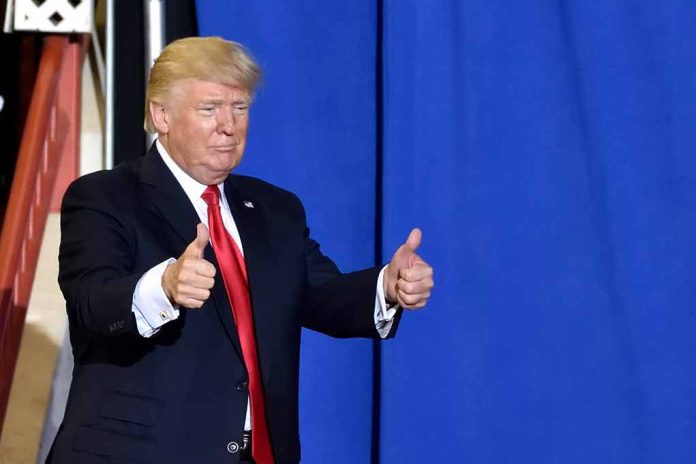
Bernie Sanders’ shocking proposal to collaborate with Trump on a $17 minimum wage leaves Americans questioning the true cost of bipartisanship.
At a Glance
- Bernie Sanders proposes working with Trump to raise the federal minimum wage to $17/hour
- Current federal minimum wage has stagnated at $7.25/hour since 2009
- Sanders calls the current wage “absolutely disgraceful” and insufficient for basic necessities
- Previous attempts to raise the wage to $15/hour failed due to lack of Republican support
- Trump acknowledges minimum wage is too low but warns of complications in implementation
Sanders’ Desperate Plea for a Wage Hike
In a move that has left conservatives scratching their heads, Senator Bernie Sanders has extended an olive branch to President-elect Donald Trump, hoping to collaborate on raising the federal minimum wage. This unexpected alliance comes as Sanders, a self-proclaimed democratic socialist, continues his crusade against what he deems “poverty wages.” But at what cost to American businesses and the economy?
During an appearance on NBC’s “Meet the Press,” Sanders unveiled his latest scheme to artificially inflate wages, proposing a staggering $17 per hour minimum. This comes after his previous failed attempt to force a $15 minimum wage through Congress, which rightfully garnered zero Republican support. It seems Sanders is willing to make strange bedfellows in his relentless pursuit of socialist policies.
The independent senator said on Sunday that he hopes to work with the president-elect on raising the federal minimum wage. https://t.co/SRsjzlCs0a
— Newsweek (@Newsweek) December 15, 2024
The Real Cost of Minimum Wage Hikes
While Sanders paints a rosy picture of workers suddenly flush with cash, the reality is far more complex. Raising the minimum wage to such exorbitant levels would undoubtedly lead to job losses, increased automation, and skyrocketing prices for goods and services. Small businesses, already struggling under the weight of Biden’s inflationary policies, would be hit hardest by this misguided proposal.
Trump, to his credit, has acknowledged the complexities of implementing a one-size-fits-all minimum wage increase across states with vastly different costs of living. This nuanced understanding stands in stark contrast to Sanders’ simplistic, heavy-handed approach to economic policy.
Bernie Sanders says he hopes to work with Trump to raise minimum wage https://t.co/Fl4m5UQUWQ
— The Hill (@thehill) December 15, 2024
The Hypocrisy of Socialist Economics
It’s ironic that Sanders, who has spent his career railing against the “millionaires and billionaires,” now seeks to curry favor with a billionaire president-elect. This apparent willingness to compromise his principles raises questions about the sincerity of his socialist convictions. Are we witnessing a genuine attempt at bipartisanship, or merely a desperate ploy to remain relevant in a changing political landscape?
Moreover, Sanders’ fixation on the federal minimum wage ignores the fact that many states and municipalities have already implemented their own higher wage floors. This top-down, one-size-fits-all approach is typical of socialist thinking, disregarding local economic conditions and the autonomy of state governments.
As conservatives, we must remain vigilant against these thinly veiled attempts to expand government control over the economy. While the allure of higher wages may seem tempting, the long-term consequences of such policies would be devastating to the very workers Sanders claims to champion. Instead of artificially inflating wages, we should focus on creating an environment where businesses can thrive, innovate, and naturally increase wages through genuine economic growth.
Sources:
- Sanders says he hopes to work with Trump to raise minimum wage
- ‘I surely hope’ to work with Trump to raise the minimum wage, Sen. Bernie Sanders says
- Sanders says he hopes to work with Trump to raise minimum wage
- Bernie Sanders Hopes to Work With Donald Trump on Key Issue

















